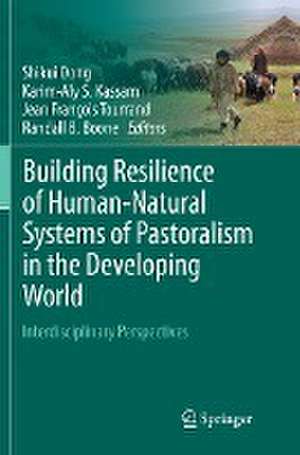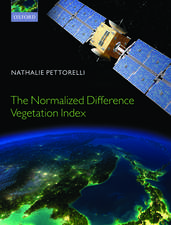Building Resilience of Human-Natural Systems of Pastoralism in the Developing World: Interdisciplinary Perspectives
Editat de Shikui Dong, Karim-Aly S. Kassam, Jean François Tourrand, Randall B. Booneen Limba Engleză Paperback – 20 iun 2018
This edited volume summarizes information about the situational context, threats, problems, challenges and solutions for sustainable pastoralism at a global scale. The book has four goals. The first goal is to summarize the information about the history, distribution and patterns of pastoralism and to identify the importance of pastoralism from social, economic and environmental perspectives. The results of an empirical investigation of the environmental and socio-economic implications of pastoralism in representative pastoral regions in the world are also incorporated.
The third goal is to identify the successful models in promoting coupled human-natural systems of pastoralism, and to learn lessons of breaking coupled human-cultural pastoralism systems through examining the representative cases in regions including Central Asia, Southern and Eastern Asia, Northern and Eastern Africa, the European Alps and South America.
| Toate formatele și edițiile | Preț | Express |
|---|---|---|
| Paperback (1) | 945.30 lei 6-8 săpt. | |
| Springer International Publishing – 20 iun 2018 | 945.30 lei 6-8 săpt. | |
| Hardback (1) | 951.29 lei 6-8 săpt. | |
| Springer International Publishing – 15 sep 2016 | 951.29 lei 6-8 săpt. |
Preț: 945.30 lei
Preț vechi: 1152.81 lei
-18% Nou
Puncte Express: 1418
Preț estimativ în valută:
180.91€ • 188.38$ • 152.89£
180.91€ • 188.38$ • 152.89£
Carte tipărită la comandă
Livrare economică 07-21 martie
Preluare comenzi: 021 569.72.76
Specificații
ISBN-13: 9783319808772
ISBN-10: 331980877X
Ilustrații: XII, 298 p. 111 illus., 91 illus. in color.
Dimensiuni: 155 x 235 mm
Greutate: 0.44 kg
Ediția:Softcover reprint of the original 1st ed. 2016
Editura: Springer International Publishing
Colecția Springer
Locul publicării:Cham, Switzerland
ISBN-10: 331980877X
Ilustrații: XII, 298 p. 111 illus., 91 illus. in color.
Dimensiuni: 155 x 235 mm
Greutate: 0.44 kg
Ediția:Softcover reprint of the original 1st ed. 2016
Editura: Springer International Publishing
Colecția Springer
Locul publicării:Cham, Switzerland
Cuprins
Chapter 1 Overview: Pastoralism in the world.- Chapter 2 Vulunerability and resilience of coupled HUMAN-NATURAL systems of worldwide pastoralism.- Chapter 3 Maintaining Coupled HUman-natural system of pastoralism in himalayas of South Asia.- Chapter 4 Sociocultural and Ecological Systems of Pastoralism in Central Asia: Cases from the Altay and Tianshanof Xinjiang and Inner Mongolia of China and the Pamir Mountains of Badakhshan, Afghanistan.- Chapter 5 Building New Coupled Human-natural Systems for Sustainable Pasture Management in South America.- Chapter 6 Adaptation and Resilience in Pastoral Management of Mediterranean Bedouin Socio-Ecosystem in the NWCZ, Egypt.- Chapter 7 Modelling Coupled Human-Natural Systems of Pastoralism in East Africa.- Chapter 8 Conclusion
Notă biografică
Dr.Dong Shikui is currently a full Professor at School of Environment, Beijing Normal University and an Adjunct Professor at Natural Resource Department of Cornell University, as well as a fellow of India China Institute and New School, New York. He completed his undergraduate and graduate studies in Grassland Science from Gansu Agricultural University in 1995 and 1998, respectively; he received his PhD in Grassland Ecology from Gansu Agricultural University in 2001; and he completed his post-doc program in Natural Sciences at Beijing Normal University in 2003.
Dr. Karim-Aly S. Kassam is International Professor of Environmental and Indigenous Studies in the Department of Natural Resources and the American Indian Program at the College of Agriculture and Life Sciences, Cornell University. He is Associate Professor in the Department of Natural Resources and the American Indian Program.
Dr. Randall B. Boone is a Research Scientist atthe Natural Resource Ecology Laboratory and Professor in the Department of Ecosystem Science and Sustainability at Colorado State University.
Dr. Jean François Tourrand is a Senior Researcher at the Centre de Coopération Internationale en Recherche Agronomiquepour le Développement (CIRAD) in France.
Textul de pe ultima copertă
This edited volume summarizes information about the situational context, threats, problems, challenges and solutions for sustainable pastoralism at a global scale. The book has four goals. The first goal is to summarize the information about the history, distribution and patterns of pastoralism and to identify the importance of pastoralism from social, economic and environmental perspectives. The results of an empirical investigation of the environmental and socio-economic implications of pastoralism in representative pastoral regions in the world are also incorporated.
The third goal is to identify the successful models in promoting coupled human-natural systems of pastoralism, and to learn lessons of breaking coupled human-cultural pastoralism systems through examining the representative cases in regions including Central Asia, Southern and Eastern Asia, Northern and Eastern Africa, the European Alps and South America.
Caracteristici
Reviews the history, distribution and patterns of pastoralism Provides an analysis framework that aims to help understand the transitions and the impacts of human-natural systems in the pastoral regions in the world Identifies successful models in promoting coupled human-natural systems of pastoralism Discusses ways to break the coupled human-cultural pastoralism system through examining representative cases in Central Asia, Himalaya, eastern Africa, the European Alps and South American Andes












